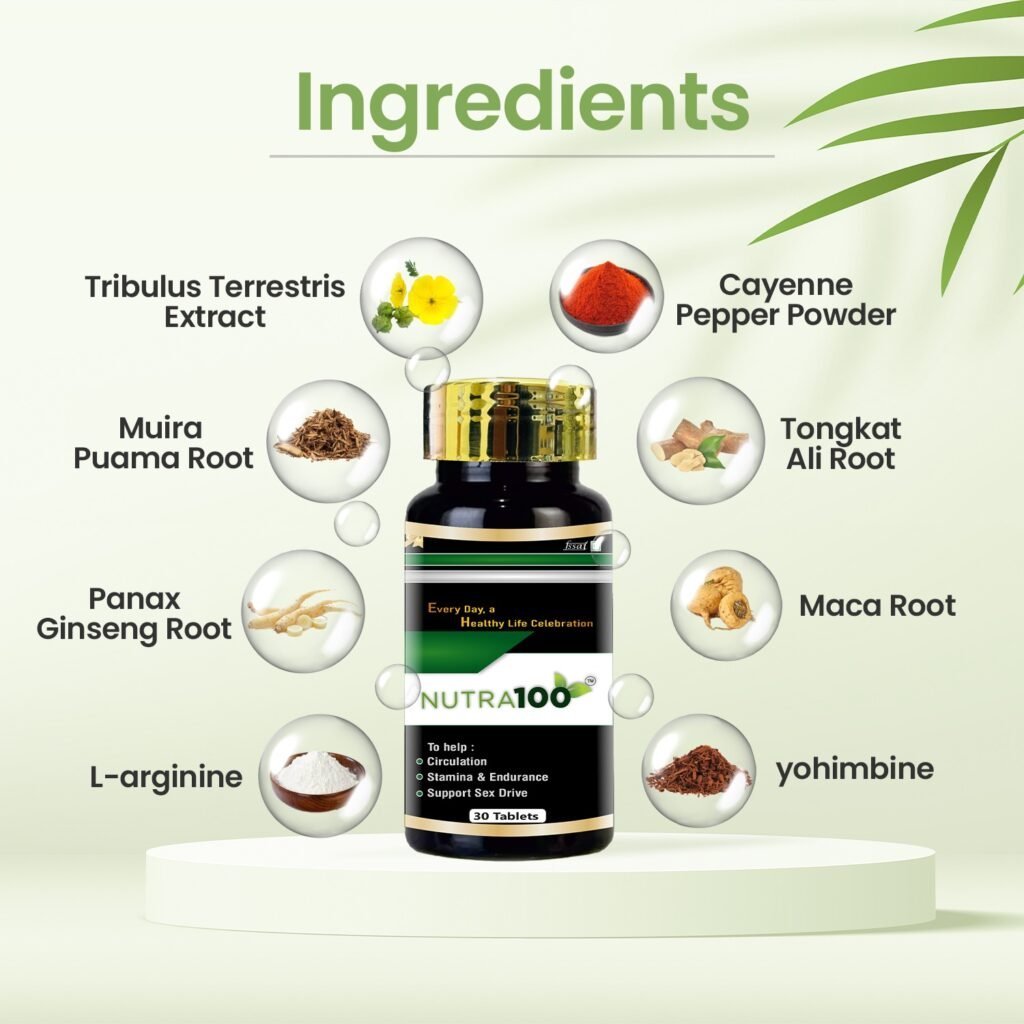
Erectile dysfunction (ED) is the inability to achieve or maintain an erection sufficient for satisfactory sexual performance. It can be caused by a variety of factors, including physical conditions (such as diabetes, heart disease, and obesity), psychological issues (such as stress, anxiety, and depression), or lifestyle factors (such as smoking, alcohol consumption, and lack of exercise). ED is common, especially as men age, and can often be treated with lifestyle changes, medications, or other therapies, depending on the underlying cause.
Erectile Dysfunction: A Comprehensive Guide
What is Erectile Dysfunction?
Erectile Dysfunction (ED), also known as impotence, is the persistent inability to achieve or maintain an erection firm enough for satisfactory sexual intercourse. While it is normal for men to occasionally experience difficulty with erections, ED is diagnosed when the problem occurs frequently over a prolonged period.
NUTRA100 : The greatest option for both general well-being and sexual health is Nutra100, and its supplements also enhance blood circulation. Sustaining optimum health and wellness is more important than ever in the fast-paced world of today. Sexual health and blood circulation are two areas that are essential to general health but are frequently disregarded. Dr. Ale Hasan, an internationally recognized nutritionist and lifestyle expert, introduced Nutra100, a revolutionary nutraceutical product that is expected to cause waves in the health and Sexual wellness sector, in response to the growing need for practical solutions in this field.

How Erections Work
An erection occurs when blood flows into the penis, causing it to stiffen and enlarge. This process is typically triggered by sexual arousal, which involves complex interactions between the brain, hormones, nerves, muscles, and blood vessels. When any of these elements is disrupted, it can result in ED.
Nutra100 : Elevate your wellness with Nutra100, a premium supplement designed to boost blood circulation, increase stamina, and enhance sex drive. Crafted with natural ingredients, Nutra100 supports overall vitality and empowers you to lead a more active, fulfilling lifestyle. Perfect for those seeking to improve their physical endurance and intimate experiences. Take control of your health with Nutra100.

Causes of Erectile Dysfunction
ED can be caused by a variety of physical, psychological, and lifestyle factors:
Physical Causes
Cardiovascular Disease: Conditions like atherosclerosis (clogged blood vessels) reduce blood flow to the penis.
Diabetes: High blood sugar can damage nerves and blood vessels, leading to ED.
Obesity: Being overweight can affect hormone levels and blood circulation.
Hormonal Imbalances: Low testosterone levels or other hormonal issues can contribute to ED.
Neurological Disorders: Conditions such as multiple sclerosis, Parkinson’s disease, or stroke can interfere with the signals between the brain and the penis.
Medications: Some drugs, especially those used to treat high blood pressure, depression, or cancer, can cause ED as a side effect.
Chronic Illness: Kidney disease, liver disease, and other chronic conditions can lead to ED.
Psychological Causes
Stress and Anxiety: Work-related stress or general anxiety can interfere with sexual performance.
Depression: Emotional disorders like depression can diminish sexual desire and function.
Relationship Problems: Issues with a partner, such as communication difficulties or unresolved conflicts, can also contribute to ED.
Lifestyle Factors
Nutra100 : Imrove Blood Circulation, Inhance sex Drive & Stamina

Smoking: Smoking damages blood vessels, reducing blood flow to the penis.
Alcohol and Drug Use: Excessive alcohol consumption and the use of recreational drugs can impair sexual performance.
Lack of Exercise: A sedentary lifestyle can lead to poor circulation, which may contribute to ED.
Prevalence of Erectile Dysfunction
ED is more common than many men realize, particularly as they age. Research suggests that around 40% of men experience some degree of ED by age 40, and the prevalence increases with age. However, ED is not an inevitable part of aging, and men of all ages can experience it.
Diagnosis of Erectile Dysfunction
Diagnosing ED usually involves a detailed medical history, physical examination, and sometimes specific tests. The evaluation may include:
Blood tests to check for underlying health conditions like diabetes, heart disease, or low testosterone.
A penile Doppler ultrasound to assess blood flow.
Psychological evaluation to determine if mental health issues are contributing to the problem.
Treatment Options for Erectile Dysfunction
Treatment for ED depends on the underlying cause and may involve a combination of lifestyle changes, medications, and other therapies:
Lifestyle Modifications
Exercise: Regular physical activity improves circulation and overall health.
Diet: A heart-healthy diet, rich in fruits, vegetables, and whole grains, can benefit erectile function.
Weight Loss: Losing excess weight can enhance hormone balance and reduce the risk of ED.
Quitting Smoking and Limiting Alcohol: Reducing these habits can improve blood flow and sexual performance.
Medications
Oral Medications: Phosphodiesterase inhibitors (e.g., Viagra, Cialis, Levitra) are commonly prescribed and work by enhancing the effects of nitric oxide, a natural chemical that relaxes muscles in the penis and increases blood flow.
Hormone Therapy: If low testosterone is contributing to ED, hormone replacement therapy may be recommended.
Injection Therapy: Medications injected directly into the penis can also help achieve an erection.
Devices and Surgery
Vacuum Erection Devices (VEDs): These devices create a vacuum around the penis, drawing blood into the shaft to produce an erection.
Penile Implants: Surgical implants, either inflatable or semi-rigid, can provide a permanent solution for ED when other treatments fail.
Vascular Surgery: In rare cases, surgery may be required to improve blood flow to the penis.
Psychological Counseling
Sex Therapy: Working with a therapist can help address the psychological and relationship factors contributing to ED.
Cognitive Behavioral Therapy (CBT): This approach can help reduce anxiety and improve sexual confidence.
When to See a Doctor
If you experience ongoing problems with erections, it’s important to consult a healthcare provider. ED can be a sign of underlying health issues, such as cardiovascular disease, that need to be addressed. Early intervention can improve both sexual health and overall well-being.
Conclusion
Erectile Dysfunction is a common issue that can affect men of all ages, but it is treatable. With the right combination of lifestyle changes, medical treatment, and psychological support, most men can regain their sexual function and enjoy a fulfilling sex life. If you or someone you know is struggling with ED, don’t hesitate to seek professional help.
